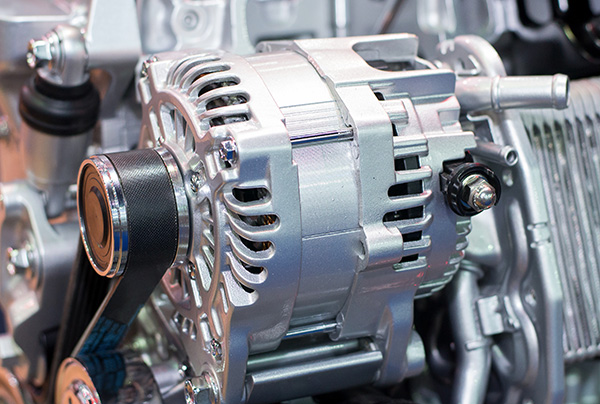
The alternator is one of the most important components in your vehicle’s electrical system. While the battery provides the initial power to start your engine, the alternator takes over once the engine is running, generating the electricity needed to operate your lights, air conditioning, radio, and other systems. It also keeps the battery charged so your car can start reliably. If your alternator starts to fail, you may experience a range of electrical problems that could leave you stranded if not addressed promptly.
Early Signs of Alternator Trouble
One of the first indications that your alternator might be failing is dim or flickering headlights. Since the alternator powers the lights while the vehicle is running, a drop in performance can cause them to lose brightness, especially at night or when using other high-power accessories. You may also notice dashboard lights acting strangely, with warning indicators appearing briefly before disappearing again.
Another common sign is difficulty starting your vehicle, even if the battery is relatively new. If the alternator is not charging the battery properly, the battery’s stored power can drain quickly. Other symptoms include slow or malfunctioning power windows, erratic gauge readings, or unusual sounds such as whining or grinding from the alternator’s bearings.
Performance Issues You Might Overlook
Sometimes alternator problems develop gradually, and drivers may not connect the dots until the issue is severe. A weak alternator can affect the operation of electronic systems in subtle ways. Your air conditioning might blow less cold air at idle, the radio could cut out when you accelerate, or your phone charger might stop working while plugged into the car. These inconveniences can point to a loss of electrical output that worsens over time.
You might also smell a faint burning odor if the alternator’s belt is slipping or if internal components are overheating. This is often caused by worn bearings or excessive friction inside the alternator. While these issues may seem minor at first, they are warning signs that the alternator is struggling and could fail entirely.
What Causes Alternator Failure
Alternators can fail for several reasons, and knowing the cause will help you prevent repeat problems. Worn-out bearings or brushes, a damaged voltage regulator, or a failing diode can all reduce the alternator’s efficiency. The serpentine belt that drives the alternator can also wear out, stretch, or break, preventing it from spinning at the proper speed. Exposure to heat, oil leaks, or road debris can damage alternator components, especially in older vehicles or those driven in harsh conditions.
In some cases, alternator issues are linked to battery problems. If a battery is weak or has a bad cell, it can strain the alternator by forcing it to work harder to maintain a charge. That’s why it’s important to check both the alternator and the battery during diagnostics.
How Technicians Diagnose Alternator Problems
When you bring your vehicle to a shop like ME Automotive, technicians start by checking the battery’s condition and charge level. They then use specialized testing equipment to measure the alternator’s output while the engine is running, often under different loads such as turning on headlights, wipers, and air conditioning. This testing helps confirm whether the alternator is producing enough voltage and amperage to meet the car’s demands.
They also inspect the belt and pulley system for wear or misalignment and check for loose electrical connections that could interfere with charging. If the alternator is making unusual noises, a closer examination of its internal components may be necessary to see if bearings or other moving parts are worn.
Preventing Alternator Issues in the Future
While some alternator problems are unavoidable due to age and normal wear, there are steps you can take to extend its life. Regular maintenance that includes checking belt tension, cleaning electrical connections, and replacing worn belts before they fail can help. Avoid overloading your vehicle’s electrical system with too many aftermarket accessories, as this can put additional strain on the alternator.
It’s also smart to have your electrical system inspected if you notice any early warning signs. Small problems caught early are easier and less expensive to fix than waiting until the alternator fails completely.
Get Expert Alternator Service at ME Automotive
If you’re experiencing dim lights, slow electrical functions, or difficulty starting your car, your alternator could be the culprit. At ME Automotive, serving Buda and Kyle, TX, we offer comprehensive electrical diagnostics and professional alternator replacement services when needed. Our technicians will ensure your vehicle’s charging system is working properly so you can drive with confidence, knowing your lights, electronics, and battery are all being powered the way they should.
Schedule a visit today and let us help you avoid being stranded by a failing alternator.